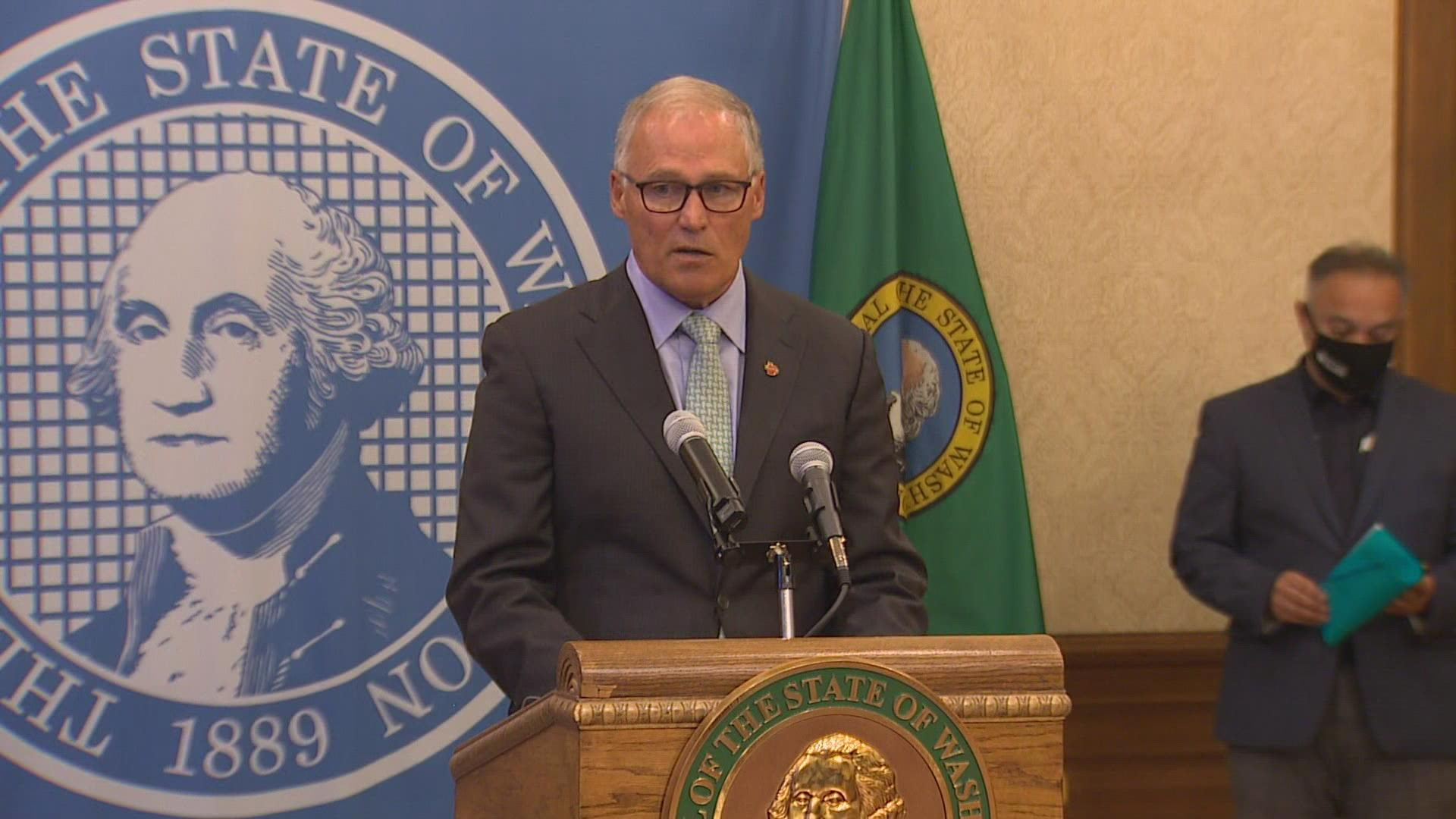SEATTLE — Gov. Jay Inslee expanded his COVID-19 vaccine mandate Wednesday, now requiring most state employees, health care workers, K-12 and higher education employees and child care providers to get fully vaccinated or face losing their jobs.
Inslee’s office said the mandate is among the strictest in the country, so far, with the state choosing not to allow a testing alternative due to the cost of tests. Also, the state said test out options in settings like schools are not efficient in preventing COVID-19 infection.
The state isn’t allowing a philosophical statement exemption option either like it has for other required vaccines.
However, as required by law, there are certain exemptions to the mandate based on medical or religious reasons.
So, who exactly is exempt, and how do they become exempt in the eyes of the state?
According to Inslee’s office, any state, school, health care or child care employee can seek an exemption based on sincerely held religious beliefs or medical reasons but will have to consult their employer or their employer’s human resources office for accommodation.
The “accommodation” wording comes from state law RCW 49.60, which deals with discrimination in the workplace and certain employee-employer requirements.
Religious Exemption
Part of RCW 49.60 prohibits an employer from discriminating against an employee based on the worker’s religion and requires the employer to “reasonably accommodate the sincerely held religious belief of an employee,” as summarized by the state’s Human Rights Commission (HRC).
The HRC’s guide to religion in the state’s non-discrimination law explains that religion (or creed) is broadly defined to include observance, practice and belief.
These beliefs are explained as being, or being similar to, traditional religions in which ultimate ideas, questions on life, death and morality are addressed.
The guide also explains that the law does not apply to ideologies, giving the example that Wiccan would fall under the category of religious belief because it is related to “ultimate” issues, while membership in the Ku Klux Klan would not.
RELATED: Yes, it is legal for an employer to require vaccinated and unvaccinated workers to be separated
The HRC’s guide says that a person does not have to be a part of an organization or church to be able to claim a religious exemption, but an employer can request some type of information from the employee or a letter from a religious leader.
The guide adds that “it is often difficult, from a legal standpoint, to challenge a person’s sincerity.”
When it comes to “reasonable accommodation,” the HRC says there are typically two avenues for employers: exemption from the work rule or a work schedule change.
Employers can claim “undue hardship” if they feel any accommodation will negatively impact other employees or violate a collective bargaining agreement.
Medical Exemption
A COVID-19 vaccine exemption based on medical reasons is covered under the Americans with Disabilities Act and RCW 49.60, the state’s law requiring reasonable accommodation.
The law covers any impairment that has a “substantially limiting effect” on the employee’s ability to be considered for or have access to terms or conditions of employment, according to the HRC’s guide.
While employers can ask job candidates if they are vaccinated against COVID-19, they cannot ask why a candidate is not vaccinated until they are an employee.
For the medical exemption, an employee must “put the employer on notice” of any existing medical condition preventing them from getting the vaccine and provide medical documentation that establishes a “reasonable likelihood” that performing the job would make their condition worse.
To reasonably accommodate the medical exemption, the employee and employer must enter an “interactive process” in which both are involved in coming up with possible accommodations. Employers are able to request additional information from the employee’s doctor or request the employee to get examined.
For both exemptions, employers do not have to choose the accommodation that the employee wants. The accommodation need only follow an interactive process, work for the employee and be effective in its purpose.
For school employees, Superintendent of Public Instruction Chris Reykdal said his office is working on creating forms for school districts to share with employees who wish to request a medical accommodation as well as information on religious exemptions.
Inslee said Wednesday “the vast majority of people” covered by the mandate “will not be eligible for unemployment compensation” if they choose to be dismissed from their jobs. He urged those considering unemployment to reach out to their doctors for more information about the vaccine.
Inslee also announced that the state was rolling back its masking mandate for indoor public spaces to once again include the vaccinated along with the unvaccinated.
The mandates, already the subject of numerous protests, come amid a spike in COVID-19 cases and hospitalizations with rates reaching their highest levels since the beginning of the pandemic.
As of Aug. 16, nearly 72% of eligible Washingtonians have received at least one dose of the vaccine. Health officials say that the number needs to rise for the state to successfully beat the virus, especially the highly transmissible delta variant.

